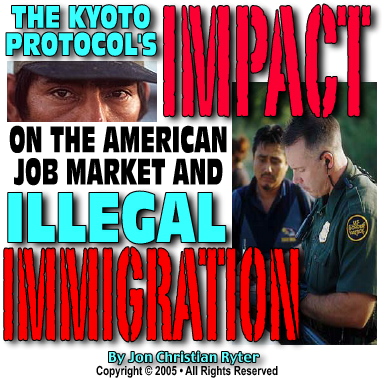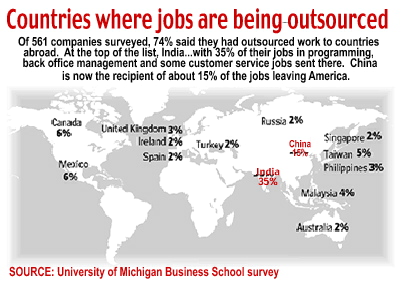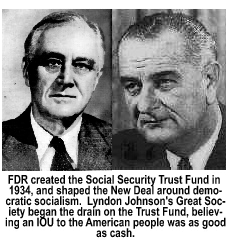
News
Behind the Headlines
Two-Cents Worth
Video of the Week
News Blurbs
Articles
Testimony
Bible Questions
Internet Articles (2015)
Internet Articles (2014)
Internet
Articles (2013)
Internet Articles (2012)
Internet Articles (2011)
Internet Articles (2010)
Internet Articles
(2009)
Internet Articles (2008)
Internet Articles (2007)
Internet Articles (2006)
Internet Articles (2005)
Internet Articles (2004)
Internet Articles (2003)
Internet Articles (2002)
Internet Articles (2001)


 obert
E. Scott, an economist with
the labor union-financed Economic Policy Institute,
noted with dismay in a 2003 article entitled "The
High Price of Free Trade" that the trade deficit
with Canada and Mexico cost the American economy 879,280 jobs
(without even factoring in China).
obert
E. Scott, an economist with
the labor union-financed Economic Policy Institute,
noted with dismay in a 2003 article entitled "The
High Price of Free Trade" that the trade deficit
with Canada and Mexico cost the American economy 879,280 jobs
(without even factoring in China). Most of those jobs, Scott noted, were high income jobs
in the manufacturing sector, and were not, as the Clinton
Administration insisted, service sector jobs that Americans
didn't want. According to an even more recent article by Scott,
buying cheap products from China cost the American job market
1,500,000 jobs last year. Another survey, done by the Information
Technology Association of America, revealed some gloomy
statistics in the IT industry. America's software industry
outsourced 104,000 jobs last year—and that number is
projected to almost double in 2005. Eighty percent of the
American companies that outsourced IT and high tech jobs to
the Middle East (largely India and Pakistan) noted that the
outsourcing proved to be not only extremely profitable, but
virtually trouble-free. Not a single computer software or
IT company that outsourced jobs last year said they had any
plans to return those jobs to the United States.
Most of those jobs, Scott noted, were high income jobs
in the manufacturing sector, and were not, as the Clinton
Administration insisted, service sector jobs that Americans
didn't want. According to an even more recent article by Scott,
buying cheap products from China cost the American job market
1,500,000 jobs last year. Another survey, done by the Information
Technology Association of America, revealed some gloomy
statistics in the IT industry. America's software industry
outsourced 104,000 jobs last year—and that number is
projected to almost double in 2005. Eighty percent of the
American companies that outsourced IT and high tech jobs to
the Middle East (largely India and Pakistan) noted that the
outsourcing proved to be not only extremely profitable, but
virtually trouble-free. Not a single computer software or
IT company that outsourced jobs last year said they had any
plans to return those jobs to the United States.

NAFTA
and the Free Trade Agreement of the Americas [FTAA]
were hyped by their political creators and the industrialists
who fill their slippers with gold as deals that will create
American jobs in America. Their statements are partially true.
They will create more American jobs but they will be America
only in the sense that they are being created by American
manufacturing corporations in the Americas—Central
America and South America. Those jobs within North
America will be Canadian.  It
is a myth to believe that either NAFTA or FTAA
will bring more jobs to the United States because both pieces
of legislation were designed as jobs-drain bills with a tariff-free
swinging door that will allow goods wearing American brand
names back into the country without the tariffs that protected
the job base of America for over 150 years.
It
is a myth to believe that either NAFTA or FTAA
will bring more jobs to the United States because both pieces
of legislation were designed as jobs-drain bills with a tariff-free
swinging door that will allow goods wearing American brand
names back into the country without the tariffs that protected
the job base of America for over 150 years.
There is a simple reality here that every American wage-earner must understand. Imports kill American jobs. Exports increase American jobs. It's that simple. When the American consumer buys cheap goods made elsewhere, more American jobs are lost. When Americans stop buying cheap goods made in China and elsewhere, and those goods sit on the store shelves unsold as higher priced American goods sell instead, more jobs are created in the United States.
Remember that the next time you're comparative shopping. Look and see where that bargain came from. If it came from Mexico, China, Indonesia, Japan, Canada or the European Union, it isn't a bargain. It's a job-stealer. Just say "no thanks" and buy American. The job you save, strangely enough, just might be your own even if what you do for a living does not appear related to the product you buy that day.
NAFTA is a mini-version of GATT (the Global Treaty on Trades and Tariffs) that was first proposed by the World Trade Organization [WTO] in the 1960s. NAFTA was enacted here only because President Ronald Reagan managed to kill GATT so effectively that the globalists in the UN and the World Bank did not think it would ever be ratified by the United States. GATT is the enforcement arm of the World Trade Organization [WTO] that mandates economic sanctions against member nations who refuse access to its markets to any other member nation without the approval of the WTO.
GATT was blocked by England in the 1960s because English trade law contained a reciprocal clause that required any nation wanting to sell goods to Great Britain to buy goods from Great Britain. Since GATT, like NAFTA would allow nations unhindered access to the markets of other nations without an obligation to reciprocate by buying that nation's products and wares, the British Parliament spiked the treaty. It was not until the European Economic Community began to morph into the European Union that the British reluctantly signed.
By that time, Ronald Reagan was in the White House. He spiked not only GATT but, in 1982, a treaty known as the International Seabed Authority that created a supranational bureaucracy with the power to regulate seven-tenths of the world's surface—its oceans and seas. The ISA was to be given the power to levy international taxes on transnational trade. In addition, it would also be granted the authority to impose production quotas on deep sea mining and oil production. The International Seabed Authority has morphed into the Law of the Seas Treaty that is currently being debated in Congress. China is using the International Seabed Authority to assert sovereignty claims over all of the oil beneath the South China Sea even though the Law of the Seas Treaty cedes sovereignty of all of the oceans and seas to the invisible empery of the United Nations. In fact, China and one or two of Standard Oil's Seven Sisters launched a joint public offering [IPO] with China in 2003 to drill for that oil.
The priority agenda of the globalist parliamentary democratic governments of the world is to dissolve the national boundaries that separate the nations and create, in their stead, a global trading union that will more effectively harness the human capital of the world under the mistaken belief that nations that share in the abundance of all of the other nations are less likely to go to war with them. The focus on population that caused the World Bank to reassess the very nature of wealth in the world in the early 1990s was the result of the population overkill in the industrialized nations due to legalized abortion*. (See footnote at end of article.)
Thirty-two years of abortion rights have erased approximately 65.5 million taxpayers and consumers from this country. The current debate in Congress concerning the restructuring Social Security to prevent the system from collapsing around 2032 is necessitated, in part, because of legalized abortion.. Had 49.3 million women not aborted their babies since 1973, and had those aborted babies been able to grow up, marry and produce children of their own, we would have about 65 million more taxpayers and consumers in the United States today—more than enough to protect Social Security...and more than enough to protect the job base that is now leaving America.
Had abortion never been legalized in the United States, there would have been sufficient consumers to buy the products, and Uncle Sam would have had 65 million more taxpayers to pay the taxes needed to keep the Treasury solvent. Had abortion not been legalized by a permissive Supreme Court that unconstitutionally legislated an incontestable law from the bench, we might still have a sufficient number of workers to support each retiree instead of what we have today: three taxpayers per retiree.
 And,
of course, had Congress not squandered the Social Security
Trust Fund to fuel Franklin D. Roosevelt's socialist
New Deal and Lyndon B. Johnson's Great Welfare
Society, investment interest on the funds in the Trust
Account would have offset much of the Social Security drain
on the Treasury today, with current benefits being paid out
of interest earnings on the account and not from the core
principal. But the Democratically-controlled Congress that
funded the welfare system from the Social Security Trust Fund
from 1934 to 1994 did squander it. Since around 1980,
the Trust Fund devolved into a chest full of IOUs from Congress
to the taxpayers. Congress still believes the pockets of the
middle class in America are deep enough to cover any budget
shortfall—even when their jobs are leaving America faster
than they can be replaced.
And,
of course, had Congress not squandered the Social Security
Trust Fund to fuel Franklin D. Roosevelt's socialist
New Deal and Lyndon B. Johnson's Great Welfare
Society, investment interest on the funds in the Trust
Account would have offset much of the Social Security drain
on the Treasury today, with current benefits being paid out
of interest earnings on the account and not from the core
principal. But the Democratically-controlled Congress that
funded the welfare system from the Social Security Trust Fund
from 1934 to 1994 did squander it. Since around 1980,
the Trust Fund devolved into a chest full of IOUs from Congress
to the taxpayers. Congress still believes the pockets of the
middle class in America are deep enough to cover any budget
shortfall—even when their jobs are leaving America faster
than they can be replaced.
President Bush knows that if something is not done during this generation to place 10 to 20 millions of additional adult taxpayers on the payrolls of those companies are left in America, the US Treasury will go bankrupt during the next decade. When the Fed goes bankrupt, that means every factory in the world will go bankrupt—and the Depression of 1929 will look like a burp compared to the global devastation that mankind will experience. Because when the Fed falls, the domino affect will take down every central bank in the world. Bush knows that the only way to add 10 to 15 million new taxpaying workers on the IRS's roster is to legalize the illegal aliens who are working under the table for cash. You might not like it. I certainly don't like it. But these are the realities—and the tragic penalty America must pay for the deaths of 49.3 million unborn babies. A permissive society is always obligated to pay for license.
Most American consumers, especially those hardest hit by layoffs and corporate downsizing, have found their discretionary income—those dollars left after the fixed monthly bills are paid—are a lot skimpier than they were in January,1993 when the co-presidency of Bill and Hillary Clinton came to Washington. The Clintons and the Democrats blame today's jobs drain on George W. Bush. In reality, the damage was done by NAFTA—which means the blame belongs to the Clintons. If you want to, you can blame Bush in 2010 when FTAA drains even more jobs from the United States and America becomes a nation composed almost entirely of Mom and Pop businesses and small, family-owned sub-S corporations. With its transnational giant conglomerates largely relocated in foreign lands, the United States will no longer possess the industrial strength and, with hundreds of environmental laws to curb the new mining of raw materials needed to manufacture the machinations of war that protected America from its enemies for a hundred years, we will become easy prey to our enemies who armed themselves with our technology while we slept.
Since we are already outsourcing a large segment of our high tech industries to India, Pakistan and China, it is only a matter of time before our entire military industry is outsourced as well—much of it to the nation that has vowed to turn America into an island of nuclear debris—China.
During the first
half of the 20th century, Russia feared America largely because
Josef Stalin marveled, during World War II, that the
United States was able to supply all of its Allies with food
and armaments to fight Hitler—and, at the same
time, arm itself and fight a multi-front war against both
Germany and Japan. America was the economic Goliath of the
world. No other nation on Earth could do what America did.
America was able to do it only because of its industrial strength.
Where are those factories that made America great a half century ago? Where are they now? Mexico? Canada? India? China?
For the most part, they are scattered throughout the underdeveloped third world and China. Make no mistake about it, China will be the enemy we fight in the next major conflict. Will we win that conflict? Not if we continue to outsource our strength.
Since NAFTA was signed into law by the CO-presidency of Bill and Hillary Clinton, America's industrial Goliath outsourced 15 million jobs to the emerging economies around the world in order to increase its profit margins—without regard for the American workers who invested their sweat equity to make those companies the titans of the world. To satisfy their stockholders—many of whom, ironically, are American workers whose 401Ks contain the stocks of the companies for which they work. To be globally competitive, American industrialists had to do more than just lower the wages paid to their workers. They also had to escape the thousand tons of costly bureaucratic regulation in the United States that not only favor labor unions, but mandate that employers provide healthcare benefits, retirement benefits, and even benefits for people who simply wanted to take a sabbatical from the workplace for three months. These regulations and fringe benefits dramatically increase the cost of the goods American companies manufacture and they widen the price gap between products made in the USA to those made in China, Japan, Mexico, Canada, the Philippines, Indonesia or elsewhere in the emerging nations of the third world and, for that matter, in the industrialized nations whose laws do not penalize management.
Since FDR's New Deal, the union-backed Democratically-controlled Congress enacted one labor law after another that drove America's industrial giants to their knees and forced them to provide their employees—the voters—with the highest wages and the best benefits packages in the world. Now the American worker is paying for those perks. Today, many of their jobs are gone. Tomorrow promises to be even worse. Tomorrow with find the American labor unions with empty halls and few dues-paying members.
But instead of pressuring the governments of the emerging nations to push through legislation to protect the transnational unions by giving them the same type of clout against management that they had in the United States, the unions will target the new sole proprietorship and Mom-and-Pop companies within the United States with promises to those employees that the unions will get them all the same benefits they lost when their former Fortune 1000 employers closed their factory and sent their jobs to China or Mexico—if they will allow the unions to represent them in government-mandated arbitration.
Now you might think the American worker is not that stupid, that once they got a job reasonably comparable income-wise to the one they lost, they would not make the same kinds of demands on the the new company that drove their original employer out of the country. Wrong.
In the late 1950s
Kaiser Aluminum opened a aluminum rolling plant in
Ravenswood, West Virginia.  Kaiser
came to rural West Virginia to tap into a cheaper labor source
and to take advantage of lower taxes and cheap land. By 1980
Kaiser, who could not compete with cheap Asian aluminum,
was in deep trouble. Kaiser was priced out of the global
aluminum market. In 1986, Kaiser asked its Ravenswood,
WV workers to take a pay cut in order to keep their jobs.
If they refused, Kaiser said, the company would have
no alternative but to close the plant since the concessions
they asked for were the difference between breaking even or
losing money. The workers, listening to their union representatives,
decided to bet on a crap shoot. They bet that Kaiser
was bluffing. They bet because Kaiser had hundreds
of millions invested in the Ravenswood facility they could
not afford to close the plant. As memory serves me, Kaiser
workers were on strike a year later when Kaiser locked the
doors and left their Ravenswood, WV plant virtually boarded
up.
Kaiser
came to rural West Virginia to tap into a cheaper labor source
and to take advantage of lower taxes and cheap land. By 1980
Kaiser, who could not compete with cheap Asian aluminum,
was in deep trouble. Kaiser was priced out of the global
aluminum market. In 1986, Kaiser asked its Ravenswood,
WV workers to take a pay cut in order to keep their jobs.
If they refused, Kaiser said, the company would have
no alternative but to close the plant since the concessions
they asked for were the difference between breaking even or
losing money. The workers, listening to their union representatives,
decided to bet on a crap shoot. They bet that Kaiser
was bluffing. They bet because Kaiser had hundreds
of millions invested in the Ravenswood facility they could
not afford to close the plant. As memory serves me, Kaiser
workers were on strike a year later when Kaiser locked the
doors and left their Ravenswood, WV plant virtually boarded
up.
In 1988, Stanwick Partners negotiated a deal with Kaiser Aluminum and assumed the Ravenswood plant. It reopened as Ravenswood Aluminum. A small rural county in the Ohio River basin, Ravenswood suffered close to 65% unemployment when the plant closed. One would have thought it would be a lesson learned, and when the plant reopened and gave the community back its life, the workers would understand that they would have jobs as long as Ravenswood Aluminum was able to compete in the global aluminum market.
Yet, the first year that Ravenswood Aluminum earned a profit, the labor union demanded income and benefits increases for the employees. When they was not forthcoming, the workers went out on strike. And, of course, Ravenswood Aluminum failed. Century Aluminum assumed control of the defunct Ravenswood Aluminum plant in 1997. Fontaine Trailer Company, which manufacturers aluminum trailers for tractor trailer rigs, bought most of the company's assets in a Nov., 2001 "going-out-of-business liquidation sale." On May 17, 2004 Kaiser Aluminum filed bankruptcy. Like Ravenswood Aluminum, they were a victim of the global market place. So, I guess, were the people of Ravenswood, WV who had two chances to keep their jobs in the United States and blew both of them.
On February 16, 2005, the Kyoto Protocol went into effect. Drafted by a team of ecoalarmists with malevolent intent that included then Vice President Al Gore and his US Undersecretary of State for Global Affairs Timothy Wirth, the Kyoto Protocol was signed in 1997 by several of the third world nations that had much more to gain than lose (since they were exempted from the drastic emissions standards that would virtually force factories in the industrialized nations to shut down). Designed almost as a doomsday device that would prevent the industrialists from changing their minds about shifting the economic power of the world away from the United States, England and the other industrial powers—Japan is exempted from the restrictions of the Protocol—if they found the job transfer not to their liking as two things happened simultaneously.
First, as the transfer of jobs to the third world and China commenced, the population depleted industrialized nations were required to open their borders to an influx of new workers from neighboring states. England, France, Germany and the Netherlands witnessed a massive migration of Islamics from the Mideast that is comparable to the emigration of Hispanics into the United States from Mexico. However, the ideological Muslims pose a security threat to the staid Europeans that is now making the European Union rethink its "open borders" philosophy as President George W. Bush pushes Congress for an even broader open door policy with Mexico (as the American people demand tightened, more secure borders as clashes between the US Border Patrol and alien and drug smugglers intensify. Sixty-four Border Patrol agents were assaulted over the last 3 months along the most popular smuggling corridor—the porous 260 mile Arizona-Mexico border).
Second, the long-term
impact of UN-brokered ecoalarmist climate-control treaty
on the major economies will be catastrophic as the industrialized
nations are forced to reduce carbon fuel emissions below their
1990 levels either by adding costly filtration systems to
existing plants, by converting plants to less offensive energy
sources, or simply by closing factories in the industrial
zones and moving those facilities to the emerging nations
that are not hindered by climate control regulations. The
choice is a no-brainer.
Small companies that opt to sanitize their factories and remain in the United States will find themselves noncompetitive in the world arena because even their own employees 'shopping "loyalties" will not favor the more expensive American-branded goods as American consumers continue to shop the "bargains" from the slave labor factories in the third world.
Tragically, now that the Kyoto Protocol has become international law, the United States is now obligated to comply with the restrictions of the UN Global Warming Treaty even though the US Senate has never ratified the treaty.
Because the Kyoto Protocol offered the emerging nations an economic bonanza if the treaty was signed by enough of the 189 UN-member nations to make it international law, the climate control treaty had a fail-safe mechanism built into it that prevented the second and third world nations from ratifying it in order to force its stringent standards on the industrialized nations. The Protocol could not be construed as ratified by the global community until the nations that produce 55% of the carbon dioxide emissions ratified it. The United States, which produces about 25% of the greenhouse gas emissions, has refused to ratify the treaty even though both President Bill Clinton and Vice President Al Gore signed it, obligating the United States to abide by its terms. (Clinton signed it a few days before leaving office in January, 2001.) Their signatures—even without ratification by the US Senate—makes the treaty binding on this country, under the terms of the Law of the Nations.) Once the UN received enough signatures from the industrialized nations to declare it ratified, it become legally binding on the United States even without its ratification. When Russia—which produces 17% of the world's carbon fuel emissions— ratified the treaty last year, the 55% threshold was achieved.
Although Bush has not made a public issue out of the greenhouse gas emissions debate, privately his advisors are as skeptical as are 87% of the scientists in the world who believe that human-made anthropogenic climate change does not exist. Bush has a geopolitical dilemma of monumental proportions. If he attempts to satisfy the global community by ordering the Environmental Protection Agency to implement the stringent standards mandated by the Kyoto Protocol, the jobs drain in the United States will escalate as he initiates his planned EU-style open door policy in the United States, bringing in Hispanic workers for jobs that simply won't exist one or two years from now, and lowering the wages for the jobs that do exist as employers bargain with prospective employees who are caught up in an unemployment glut that will make the national 25% unemployment rate during the Great Depression of 1929 look like a Sunday holiday.
 A
simple reality has surfaced over the past year or two that
the globalists who saw the unexploited human capital of the
third world as the solution to the economic problems of the
industrialists, bankers, and merchants never visualized in
their grandiose scheme to provide jobs for the underprivileged
peoples of the world by transferring American and European
jobs to those nations, and returning the goods made in the
third world to the developed economies until the third world
nations were sufficiently developed to support a consumer
economy. Who pays off the debt to the world's central banks
in the industrialized nations if the workers in those economies
lose their jobs? If there are no incomes to tax, who pays?
If no one pays, what happens? First, the central banks collapse.
Then the industries that provide the jobs and the products
in the emerging nations collapse. Then the economies of those
nations collapse as well. It will create a domino affect that
will ring the world.
A
simple reality has surfaced over the past year or two that
the globalists who saw the unexploited human capital of the
third world as the solution to the economic problems of the
industrialists, bankers, and merchants never visualized in
their grandiose scheme to provide jobs for the underprivileged
peoples of the world by transferring American and European
jobs to those nations, and returning the goods made in the
third world to the developed economies until the third world
nations were sufficiently developed to support a consumer
economy. Who pays off the debt to the world's central banks
in the industrialized nations if the workers in those economies
lose their jobs? If there are no incomes to tax, who pays?
If no one pays, what happens? First, the central banks collapse.
Then the industries that provide the jobs and the products
in the emerging nations collapse. Then the economies of those
nations collapse as well. It will create a domino affect that
will ring the world.
While the Kyoto Protocol may serve the immediate needs of the transnational industrialists it will not serve the needs of the global bankers who control all of the central banks of the world for very long. As they learned in the late 19th century and again in 1920, when one central bank fails, the domino affect will impact all of the other central banks. If the US Federal Reserve fails, all of the central banks in the world will collapse, and economic Armageddon will befall the world.
British
Prime Minister Tony Blair has urged Bush to
authorize the EPA to force American factories to lower
emissions, or mandate that they switch to lower carbon technologies.
Bush, on the other hand, is adamant. He has recently
argued to Blair and the G-8 that he needs to
see scientific evidence that human-made climate change exists,
and at what point it becomes dangerous, before he will force
American manufacturers to install costly air cleansing systems
that will make them noncompetitive with third world factories
(that are not required to meet the same standards). Bush
is determined to keep what remains of the American manufacturing
industry here. The United States has spent over $23 billion
on climate change science over the past decade but has found
no tangible evidence that carbon fuel emissions cause climate
change. Blair, who chairs the G-8 this year,
has made climate change one of his top priorities. If Blair
succeeds in implementing the standards of the Kyoto Protocol,
it will be a temporary victory, because none of the major
economic powers can adhere to those standards and remain competitive.
The consequence of failure will be nothing less than a global
economic collapse.
Footnote: *Overpopulation was never a problem in any of the industrialized nations of the world. Overpopulation has been a problem only in the economically underdeveloped third world where birth control through abstinence or the use of contraceptives are not taught since few women receive any formal schooling. Since women are not taught how to prevent pregnancy, not only does the birth rate (and the prenatal death rates) soar in the undeveloped nations, the age at when females conceive drops drastically. It is not uncommon to see ten and eleven year olds with babies. Since the WTO has been unsuccessful in teaching abstinence or getting men to use contraceptives, the UN has uses abortion as its sole means of birth control. But, it is only during Democratic administrations that US dollars are available to fund abortion in the third world. As a result, the industrialized nations have become sorely population-depleted and the third world nations have become too saturated. Without war to deplete these populations, the "job" is generally accomplished by famine. Today the UN is attempting to jump-start the migration of the jobless in the second and third world countries to the underpopulated industrialized nations whose tax bases are sorely threatened by the absence of the world' most valuable asset—people.

Copyright © 2009 Jon Christian Ryter.
All rights reserved.


